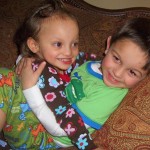I don’t recall the who exactly quoted that Wolf-Hirschhorn is a 1 in 50,000 frequency. This number has stuck in my head for 2 years now, which is how long we’ve known about Kendall’s diagnosis. We’ve all read about this number and wonder at times how we got selected as that 1 occurrence. Well, I have been really questioning the WHS rate of frequency for some time now and I really can’t seem to pin an accurate number on it. Of course, we’ll never really know until we get all of the kids identified and divide into the population across a large sample set. I do know that the rate of frequency is far less than 1 in 50,000 and I challenge the person who quoted it to a count-off.
I’m not a primary research professional, but I consider myself pretty good at numbers. Here’s some quick math. The population of Chicago is roughly 3 million. As far as I can tell, I’ve counted only a handful of people that I know of that live in Chicago that have WHS. I only know of 4 kids, so I am going to throw a conservative number at this ratio. Let’s say 10 on the high side in all of Chicago, which puts it at 1 in 300,000.
Let’s use another example. There are about 310 million people in the United States, which is data from 2009. If we take the count from the listserv of the 4p- group, there are 250 people in that distribution (last email I sent told me 244 people). Let’s be conservative and double that number, assuming that not everyone is on this particular list. Using 500 in the US as a swag, we’re now at 1 per 620,000ish. We would need to double that number again to 1000 to get to the 1 in 300,000 number that came out of the Chi-town example.
One more example. This one is without numbers, but depicts the infrequent nature of our syndrome. Of the 2 geneticists we met upon Kendall’s diagnosis, they saw the syndrome maybe 3 times between the 2 of them. They have 60 years of experience between them in the Chicago area and practice in 2 popular hospitals in the Chicagoland area. Very rare indeed.
So, why does this come up? Well, Cathy and I sat down today and spoke to a woman about Kendall’s transition into pre-school for the coming fall. Her role is to take kids in EI and place them into the school system. She works in a district that supports a population of around 200,000 people and in the 5 years she has been doing this, Kendall is her only experience with Wolf-Hirschhorn Syndrome. She had never heard of it before.
So, what is the conclusion? Well, I am going to go out on a limb and say that we’re looking at somewhere around 1 in 516,617. Yes, this is a guess, but an educated one. Starting at 500 in the US and adding those people that are not aware that WHS is the diagnosis based on the lack of technology when they were born; adding an additional 100, or 20%. It is likely that there are a number of adults that are undiagnosed, but I would think that there are very few of them that we do not know of. When I say ‘we’, I refer to the WHS community as a whole. From what I have observed, there are very few identified WHS adults over the age of 35. So, as a collective whole, we are probably aware of a high percentage of the WHS population. So, 310,000,000 divided by 600 is 1 in 516,617.
It continues to amaze me that this is truly a strike of lightning. At some point, I would love to know what the real number is; not for any other reason than just to know.
If I am missing something, please step forward…
13 Responses to Wolf-Hirschhorn Frequency
Leave a Reply
Donate to wolfhirschhorn.org
subscribe
Contribute Your Story
To share your story, create your LOGIN and sign in once you receive your password via email. After logging in, write your story, upload pictures and publish your story! It's that easy. If you would like to comment on our stories, you can comment without creating a login. Each comment is posted once approved. If you need help, please email us.WHS Growth Chart
In 2007, a WHS growth chart was created. Download the Wolf-Hirschhorn Syndrome Growth Chart here.Most Popular Topics
1st Birthday 2011 Easter Birthday contest results Dentist development Doctor Visits Early Intervention eating family feeding Feeding Tube food Fund Raiser Halloween Halloween 2011 Halloween Contest Holiday Hospital introduction IQ Kidney Transplant kidney ultrasound Magnolia milestones Nayana Parent Profile physical therapy pictures School scooting Seizures Siblings Sitting Position Social Media Special Needs Speech Therapy talking Therapy Top 10 List Unborn Child update video Walking Weight GainSelect Your Story
- Addilynn (2)
- Alexander (9)
- Alexia (2)
- Ali (1)
- Amelia (23)
- Ansel (1)
- Arianna (2)
- Arin Rae (16)
- Ava Lynn (8)
- Ava Ruby (1)
- Bethany (2)
- Blake (3)
- Brett (2)
- Brodie (15)
- Caroline (9)
- Casen (1)
- Cassidy Renee (2)
- Charity (1)
- Charlotte Ellen (1)
- Claire (3)
- Clover (3)
- Contest (19)
- Corrine (1)
- Corwin (2)
- Dakota (1)
- DeLaney (1)
- Deliany (1)
- Denise (3)
- Devin (3)
- Dylan (16)
- Elijah (4)
- Ellye (3)
- Elsa (32)
- Emily Rose (5)
- Emma (7)
- Esme (3)
- Esperanza (2)
- Evan (2)
- Eve (3)
- Evelina (1)
- Evvie (2)
- Featured Stories (14)
- Fiona (4)
- Frank (6)
- Fund Raiser (13)
- Garner (1)
- General Information (23)
- Giveaway (3)
- Grace (5)
- Halloween (28)
- Harry (1)
- Hayden (2)
- Isabella (4)
- Isabella N (6)
- Jaap (1)
- Jada (2)
- Jake (1)
- James Douglas (2)
- Jon York (1)
- Joseph (1)
- Juliana (2)
- Justin (1)
- Karly (4)
- Karson (2)
- Kaylee (13)
- Kayleen (1)
- Kendall (82)
- Kinga (2)
- Leo (2)
- Liam (7)
- Liam John (1)
- Lisa (3)
- Lists (2)
- Lucy (1)
- Madison (7)
- Magnolia (7)
- Marley (2)
- Marshall (1)
- Mason (3)
- Matilda (1)
- McKenzie (6)
- Mia Rose (27)
- Natalie (1)
- Nathan (1)
- Nathaniel (28)
- Nayana (3)
- News (3)
- Norrah (18)
- Olivia (1)
- Olivia Grace (6)
- Olivia Stella (1)
- Paisley (1)
- Parent Profile (2)
- Peyton (4)
- Quinn (2)
- Reese (1)
- Region Gatherings (2)
- Renee (1)
- Rheyn (6)
- Riley (6)
- Rochelle (3)
- Ryley (2)
- Sabrina (10)
- Savannah (1)
- Sergio (2)
- Shadyn (1)
- Social Media (10)
- Sophia (6)
- Talia (2)
- Talon (1)
- Tanner (13)
- Taylor (10)
- Taylor T (3)
- Teejay (4)
- Tommy (2)
- Tyler James (5)
- Tyler Jay (1)
- Unborn Child (7)
- Uncategorized (128)
- Vincent (1)
Google Ads 1
Google Ads 2
Google Ads 3






Kevin – I agree that WHS seems more rare than reported… IN ONE SENSE. And then on the other hand because of Facebook, blogs and our local community WHS seems much more frequent.
Now, if we could just figure out how to get an accurate number. I, for one, am very curious. 🙂
Lauren- I am guessing that it seems frequent because we are being found. The Facebook pages have other people outside of just the WHS families, so that number may be skewed a bit. I think the east coast number may be higher, especially around Lancaster, PA!
I have also run the numbers and done the math, trying to figure out this statistic. If my math was correct, (with 1 in 50,000) I figured about 85 WHS babies are born each year in the US, which doesn’t sound right.
On the other hand, the geneticist who diagnosed my son (in the Chicago area), says she has diagnosed it about once (sometimes twice) a year for the past 15 years or so. She indicated that most of those babies did not live for very long after diagnosis. At the time I was in much too much shock to ask any intelligent questions or to clarify her numbers with her.
Kevin, I love that you brought this up. Justin and I were just talking about it. We had read some time back that it was calculated recently at about 1 in 90,000. I have told a few other parents but never got into a deep discussion about it. I do agree with you that it is even more rare than that. We live in the Philadelphia area and go to CHOP for everything. The only person there so far that has heard of it is the geneticist and she said she had only seen 2 other cases of it. I’m thinking, age wise, she probably should have retired about 10 years ago so that should tell us something. CHOP is #1 in the nation and the most of the specialists have never heard of WHS. I definitely think you’re on to something. It is bizarre how many of us are in the area I live in though. I mentioned it when were at CHOP today and the doctor we saw said it seems like that because we live in a highly populated area. Anyway, I would love to see a more accurate number as well.
I may need to go back to the drawing board on this. My numbers considered the population and the frequency at which it currently EXISTS. What needs to be considered is the frequency at which it occurs in birth rates. The estimate I came up with does not take into account the children that don’t make it past a certain age or that are never born. The number should go up, but not by much.
Kevin – good catch! I wanted to add that similar to what Heather wrote our cardiologist told me yesterday that they see one WHS kid every year or so in the NICU in our local area.
Some of those kids make it and some do not. Then we would also need to account for those kids who are never in the NICU, like Norrah. She would have passed these doctors by.
I think Lauren has a good point. Brandon and I have talked about this topic and wonder how many kids are out there that are not diagnosed. The range of functioning is so broad that I’m sure they are many. As an OT working in many different states, I can think of a few kids that may fit the diagnoses, had many of the characteristics, but were only diagnosed with MR or developmental delays. I only know of 3 kids in SC, including Riley, which seems like a pretty low number. Interesting topic and conversation.
Very interesting. And now I am wondering about the accuracy of the 1 in 50,000 rate of occurance. Here in Australia, we have a very inaccurate record of families who have children with WHS. Many are not involved with the support group. They either were members once, and dropped off the radar, choose not to be, or have had children that died.
My paed knew of several children with WHS that he had seen over his 20 years of practice. In fact he was trained by the geneticists in Melbourne who coined the Pitts-Rogers-Danks syndrome. I do think that there are many out there who are undiagnosed, or diagnosed incorrectly. I know Ryley only got his diagnosis (aged 2) because of the FISH test. His deletion is apparently quite small. I think things have changed now here in Australia and the FISH testing gets done more often than not.
Fascinating though.
My aim for Australia is to try and find some of those ‘missing’ families and hopefully encourage them to come along to the next conference (which we are hosting).
Kevin, I just wanted to share something with you. friday before Tanner’s surgery we were speaking with Tanner’s urologist. He used to be a surgeon in Seattle and has had patients with WHS before and is very involved with Turner’s syndrome. When we got to talking about the odds he agrees with you. He said it’s somewhere like 1 in 300,000. He said that’s comparable to the liklihood of having conjoined twins!!! I feel like conjpined twins are usually national headliners though, no???? I don’t hear about that as often as WHS……but I live in the WHS world so that may not count. I don’t know how totally accurate all of that is but it’s still shocking.
Fascinating discussion. The population in the Republic of Ireland is roughly 5 million people (there have been a lot of changes recently due to recession!!) We have about 12 families on our list.
i am convinced that there are far more families and children out there that have not been diagnosed. Certainly the rate of diagnosis is improving in comparison to the past, but geneticists still tell us it is very rare. Certainly I know of 2 families whose WHS children have died in the last 2 years. More have have died before being diagnosed.
I have identical twin daughters with WHS. I am told that is very rare. They are now 15 years old. What are the odds on that?
Thanks for the chance to be involved in this discussion.
Damien.
I agree that it’s more rare. We live in Hong Kong, where 99% of the health care is through the public system, and there’s one government genetics lab, and they’ve only seen “a few” cases. There is only one major public hospital for complex pediatric issues, and they’ve never seen a case before our daughter, and we have 7.7 million people. The Hong Kong incidence is looking more like one in a million or two.
Stepping up! I’m in hong kong too. My DD was recently dx. Robby, can we connect?
I have a 4 month old with whs and she has 2 siblings from my husbands past relationship with whs. We live in Tulsa, OK. My husband has a touching chromosome and thats why 3 out of his 4 kids have this syndrome. My baby is 4 months and I’m trying to educate myself on everything about this syndrome as I can. I’ve tried to find other people in this area that have whs but so far I haven’t found anyone. I’m beginning to wonder if our 3 kids are the only kids in our area